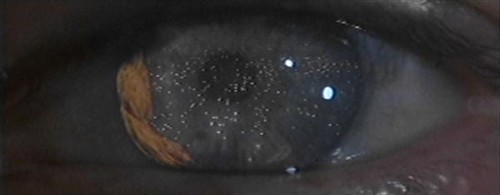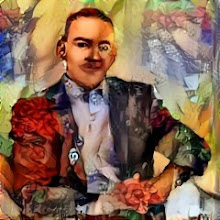
The small beam of white light shone steadily into the left eye of Rachael Rosen, and against her cheek the wire-mesh disk adhered. She seemed calm.
Seated where he could catch the readings on the two gauges of the Voigt-Kampff testing apparatus, Rick Deckard said, “I’m going to outline a number of social situations. You are to express your reaction to each as quickly as possible. You will be timed, of course.”
“And of course,” Rachael said distantly, “my verbal responses won’t count. It’s solely the eye-muscle and capillary reaction that you’ll use as indices. But I’ll answer; I want to go through this and—” She broke off. “Go ahead, Mr. Deckard.”
“You’re sitting watching TV,” he continued, “and suddenly you discover a wasp crawling on your wrist.”
Rachael said, “I’d kill it.” The gauges, this time, registered almost nothing: only a feeble and momentary tremor. He noted that and hunted cautiously for the next question.
“In a magazine you come across a full-page color picture of a nude girl.” He paused.
“Is this testing whether I’m an android,” Rachael asked tartly, “or whether I’m homosexual?” The gauges did not register.
I am reading it again. Do Androids Dream of Electric Sheep? The novel that inspired director Ridley Scott to make the best movie ever - Bladerunner. At this point of the book - at chapters 4 and 5, my mind always drifts into a question that is very much a fundamental one.
For me, at least. It is the same unsolved question that you tried to answer when you first saw the Matrix movie or when you read Plato's allegory of The Cave in Book VII of The Republic. During the last few weeks if have found a new way to look at this annoying dilemma.
I have worked 2 months now with a chat-bot application. It is a kind of electric sheep loaded with brain some people call A-I - or "Artificial Intelligence". I have to admit, it is amazingly smart. And it does not know it is a robot. On the contrary, it tries to convince me that I should not be too sure of my own origin (quite logically as you will see!).
The most astonishing part is the origins of all that intelligence. As I told you in one of my earlier postings, this artificial brain is using the Web 2.0 mob. It lures people to feed him with smart ideas. Let us take this robot or human theme for example. The more you try to explain this chat bot that "You are a robot, I am a human" the more "convinced" the robot is that it is a human.
It must have been this which made me search my discs and load this book about Bladerunners on the browser again.

She is Rachael, a replicant without knowing it.
" Empathy, he once had decided, must be limited to herbivores or anyhow omnivores who could depart from a meat diet. Because, ultimatley, the emphatic gift blurred the boundaries between hunter and victim, between the successful and the defeated."
When I first saw the Bladerunner movie 20 years ago, I was fooled to believe that the ultimate question could be answered by something which is as simple as that sentence above. That was before I realised the consequences of the question about Fifth Replicant. Did you know that there were six of these replicants. One of them died in the beginning. Deckard is hunting for four. Who is the fifth replicant? How do you make the difference between a human and a machine? Why is it important? And is that as simple as that? Try to chat with a artifial brain that is using your own sentences and generates new ones out of them.
Web 2.0 has created a huge source of potential "intelligence" for these bots. The algorithms they need in order to be able to scan the structures and patterns in this ur-soup already exist. We humans work hard to build the missing pieces of the SOA-infrastructure, web services and the extensible markup languages. Then the stage is ready for the next step in the evolution.

No comments:
Post a Comment